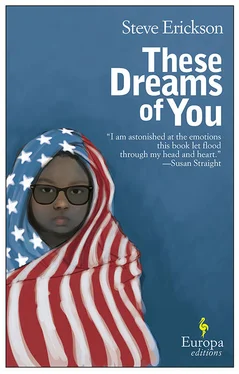Zan and Viv used to joke that Parker was conceived in Berlin. When they split up years before and Zan ran to Berlin, it was where he realized he belonged back with Viv; not long after that, she was pregnant. Coming undone, Zan went to Berlin because it was the farthest place he could go before the act of traveling east turned into the act of returning west. But mostly he went because he got on the wrong car of the train. It was the aftermath of the publication of his last novel that somehow turned into a political weapon and cost another man his livelihood; those were the years when the sense of possibility that it once seemed his country might fulfill, the sense of possibility that reminded Zan what a fever dream his country could be when he was young. . that possibility was on the run as well. The Berlin Wall was his country’s final outpost. It was where presidents said, Tear it down, and, Let them come to Berlin, and where a future president said, not so long ago, This is our time.
A New World man hurtling into the heart of the Old World, Zan ran and ran in that moment of his undoing, guilt and failure so close behind that they weren’t at his back so much as on it. Ran to Berlin and, where the Wall used to be, tore from his damned guilty novel its pages and shred them, and sprinkled them on the Wall’s rubble as though that could absolve anything.
Now in the Paris hotel on the rue d’Alsace, Zan drifts, his dreams not quite dreams, somewhere between anxious dreams and figments of disorder. In the small cabin of his cross-Atlantic ocean liner, X plots his authorship of the Twentieth Century, having had the good stroke of fortune to stumble on its literature before anyone else could write it first. Not entirely unmoved by the ethics of the situation, he reasons nonetheless that in a sense writers always are plagiarizing something albeit unconsciously, things they’ve read or heard or seen that they re-manifest in some singular fashion that’s the only true measure of a writer’s originality. As a man literally ahead of his time, X understands that “originality” will be a quaint notion in the next century, with its evolution to a higher philosophy about hybrids and appropriation: I can’t be the first person this has happened to, he thinks, this going-back-in-time thing. Maybe all pioneers are out of time, bearers of the future to the past. I’m the first literary sampler, concludes X. I’m just sampling a whole novel, that’s all.
And after all, if I produce the novel first, who’s to say I’m not the author? If you get right down to it, how often have I felt I was onto something ten years before younger writers came along and got more attention for it? Who’s to say that in another time the Irish poseur didn’t himself get knocked on the head and wake up and steal the novel from someone else? In fact, who’s to say that in another past, the Irishman didn’t get knocked on the head and wake up and find my version of the novel that I’m copying now, dropped beside him ? Maybe my version of time, thinks X, is the true prototype while the other is the clone.
To be sure, dilemmas present themselves. The first is that, thoughtlessly, the black teenage girl in Berlin who hid in the shadows while X was beaten neglected to deposit at his side, along with the one book, the rest of the century’s canon, which X hasn’t exactly committed to memory. Grimly realizing he’ll have to write his own versions, he brightens: Who’s to say I can’t write them as well or better? But something else nags at X; he’s not sure he can put his finger on it. . but if the same words are written by a different writer, then are they the same words? Is it still the same book? Or is the text transformed by the experience and persona behind it? And as X imagines writing his own versions of these novels, he begins leaving out passages of the book he copies now — it just goes on and on and on , he groans — because no one can possibly miss them; and then it isn’t such a far leap from cutting to editing to revising to recasting, enhancing, reimagining, improving .
This begs of X the most profound question of all. That question is whether it’s possible for someone of his country to speak for the Old World. X is of and from a country that no sooner became the New World than it was time’s other bookend, or floated outside time altogether; he is of and from a country that always has belonged to the rest of the world’s imagination more than it belongs to its own. Now X labors to author the novel where the literature of the Old World discovers the vision of the New and waves goodbye to itself. Dublin? X would never be able to explain Dublin anyway. But if he doesn’t know much about Dublin 1904, then let the story take place in the Los Angeles of 1989, seventy years early. Nighttown will be Twilighttown and Molly will be Dolly, and Bloom will be Zoom or Doom or Groom (as in a man searching for a bride) or Ploom (as in a column of smoke) or Woom (as in where a mother carries a child). Or Toom (as in where you’re buried).
Zan wants to kill X. In his sleep, he seethes at the character with every passing word, growing more furious: This is why you’re a failure! he screams at him silently in the dark of the rue d’Alsace hotel. You have a chance to be the greatest novelist of all time, author of the literature of the century, and you rewrite it.
With John’s revision of Matthew, Mark and Luke, Zan tells the university seminar in London a week and a half ago, though it seems longer now, “the novelization of history replaces history itself.” John’s version of the narrative means to preclude all others. It means to banish from history those who are deaf to its music and to declare all other sins trivial compared to the sin of deafness. John’s is the narrative as sustained hallucination, totalitarian in the manner of all great art. With paper and the printing press, the act of creation becomes an intimate one, the act of reading a private one, at which point storytelling is liberated from avoiding the forbidden in order to pursue it. The transformed imagination transforms the conscience. From John’s novel there can only be one place to go, the Book of Revelation, “which isn’t a novel at all,” Zan tells the lecture hall, “but a rave.”
Zan can’t kill X. If he kills X, the rest of Zan’s novel vanishes into the future. But as the ocean liner continues its way to New York, in the early morning hours a mysterious and unseen stranger bearing a strong resemblance to Zan himself breaks into X’s cabin and beats him senselessly.
When Viv went to Addis Ababa the first time to get her new daughter from the orphanage, lying on the hotel bed and feeling the small girl next to her at night she heard the sax line of a song drift through the open window.
It was a song that Viv heard everywhere in Ethiopia; later Zan would play it on his radio show. “Tezeta”—meaning memory, or nostalgia, or reminiscence or melancholy — was not quite a title as much as a musical species like the blues, and in this land where memory is a euphemism for the blues, this curling melody always sounded the same to Viv’s ears, whether played on sax or piano: smoke that got in your ears rather than your eyes. When the girl lying on the bed next to the mother ran her finger along the outline of Viv’s profile to make certain she was there, it felt to Viv like smoke itself.
Now on her return to Addis to find Sheba’s mother, when Viv stops in the labyrinth at the city center where the driver has led her and says, looking around, “No, this isn’t right,” she hears “Tezeta” rise mournfully in the distance like an answer. She has no idea what the answer is. The walls of the passages resonate with distant chants, the thunder of gathering storms, and Viv feels the past and future yearn for each other. Though she’s almost certain the song she hears isn’t just in her head, now she hears things in the Ethiopian memory-blues that she never heard the first time, lying on the hotel bed with Sheba beside her.
Читать дальше











